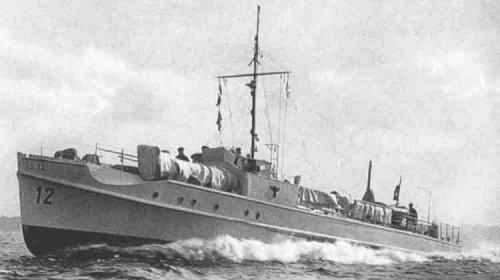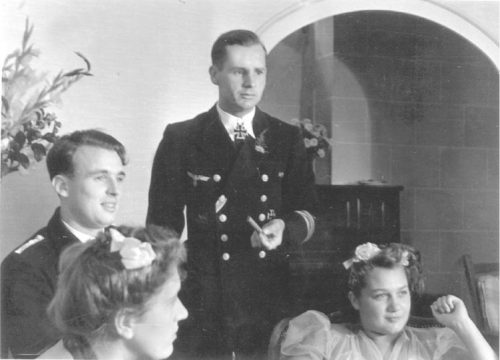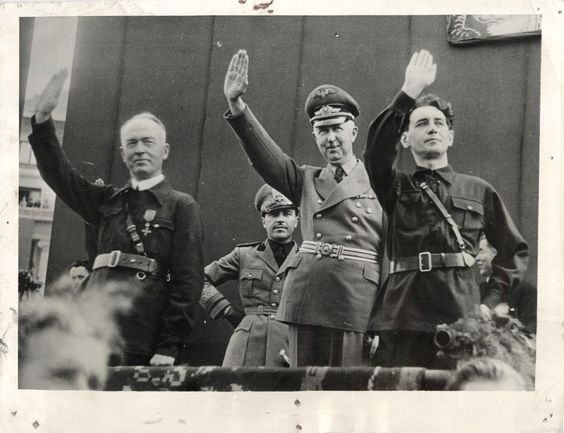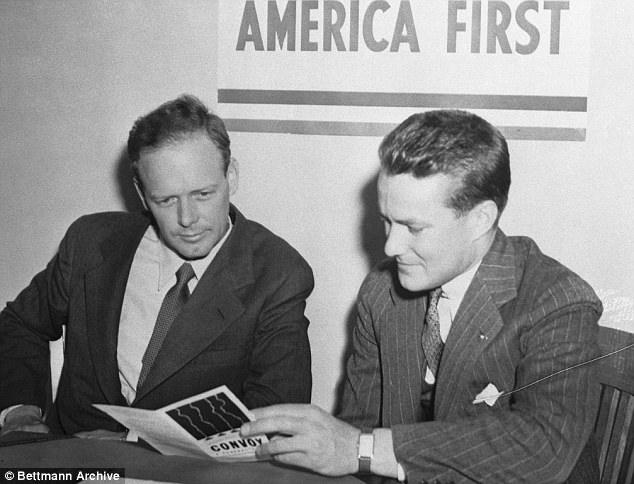Thursday 30 January 1941
 |
| "A Vickers machine gun crew outside Derna, 30 January 1941." © IWM (E 1818). |
Italian/Greek Campaign: The Greeks continue on 30 January 1941 trying to pry the two Italian Blackshirt Battalions off Mount Trebeshina. The Cretan 5th Division of III Corps has joined II Corps in the effort. The Italians are dedicated fascists and continue to hold out.
Alexander Koryzis takes over as Prime Minister from the recently deceased Ioannis Metaxas. On the positive side, Koryzis is not a dictator like his predecessor. On the downside, though, he is not seen as being nearly as forceful in dealing with the difficult military situation.
East African Campaign: At Mount Cochen, five Italian colonial battalions supported by artillery push back the 14th Punjab Regiment and 1st Battalion of the 6th Rajputana Rifles Regiment. It is a rare victory by the Italians, matching one recently in a similar manner in Albania.
The 5th Indian Division, meanwhile, is attacking the Italian 2nd Colonial Division commanded by General Angelo Bergonzi at Barentu. Bergonzi has nine battalions containing 8000 men and 32 guns, a not inconsiderable force in the interior. Not only is Bergonzi successfully defending his position, but he is able to launch some occasional counterattacks. His position, however, depends on flank protection on other forces holding Agordat, and that is in doubt.
Battle of the Atlantic: In a speech before 18,000 at the Berlin Sportpalast to honor the anniversary of his accession to power in 1933, Adolf Hitler announces that any ship bringing supplies to Great Britain will be sunk. This is a very sensitive topic, considering that it would be dangerous to provoke the United States, but Hitler hints darkly that bad things will happen to the United States if it tries to intervene militarily. Hitler is feeling very confident and expounds that this will be "the crucial year of the great New Order in Europe." He, in fact, will be absolutely correct, but not in the way that he intends or desires. Another of his remarks:
German battlecruisers Gneisenau and Scharnhorst, having sailed far to the northeast in order to evade patrolling Royal Navy warships south of Iceland, rendezvous with 6358-ton tanker Adria. The weather is horrendous, however, and refueling operations are impossible until the weather clears.
U-94 (Kptlt. Herbert Kuppisch), on its second patrol out of Lorient, follows up the sinking of West Wales on the 29th with the sinking of 5125-ton British freighter Rushpool. The Rushpool is another straggler from Convoy SC 19 due to the weather. All 40 men on board survive, picked up by Convoy SC 19's escort HMS Antelope.
The Luftwaffe bombs and sinks 3677-ton Norwegian freighter Austvard 130 miles west of Galway Island, Ireland. There are 23 deaths and five survivors. The event is tragic because the lifeboats were damaged or destroyed in the attack, and many survivors perished because they took refuge on rafts that later disappeared.
The Luftwaffe bombs and damages 5266-ton British freighter Olympier in the Southwest Approaches about 250 miles out to sea. However, the freighter is able to continue onward to port.
German 2530-ton freighter Konigsberg hits a mine and sinks in the Elbe near the Elbe 1 lightship.
The Luftwaffe strafes Royal Navy destroyer HMS Vimiera in the North Sea while attacking Convoy FS 397. The destroyer sustains only light damage.
Convoy HX 106 departs from Halifax, escorted by battleship Ramillies, Convoys SL 64 and SLS 64 depart from Freetown.
Royal Navy destroyer HMS Goathland is laid down.
U-555 (Kapitänleutnant Hans-Joachim Horrer) is commissioned, U-175 and U-217 are laid down.
Battle of the Mediterranean: The Italians spend much of the morning extricating the last civilians and stores from Derna. The evacuation is aided by attacks by the Regia Aeronautica and well-placed artillery, all intended to pin the advancing Australians down for sufficient time to make the evacuation succeed. The Italians make good their escape, and then the Australians walk in basically unopposed. It is another brilliant success for Operation Compass.
After taking the town, General O'Connor in the evening decides to ask Middle East Commander Archibald Wavell for permission to have the Australians pursue the retreating Italians northwest of Derna along the Via Balbia. More desert sandstorms hinder operations, and the supply lines once again are becoming quite extended, a serious issue particularly in terms of having sufficient water supplies. Wavell, in Nairobi until the 1st, will give O'Connor his answer upon his return.
The next town is Giovanni Berta, but it will take at least another few days to get there. The plan is for the 7th Armoured Division to proceed cross-country south of the Jebel Akhdar (Green Mountain) via Msus and Antelat. Thus, the British forces would be divided by the mountain, the Australians to the north and the 7th Armoured to the south. As it will be slow going for the British tankers, General O'Connor proposes to split off his fast wheeled vehicles under the command of Lieutenant Colonel J.F.B. Combe and send them ahead. This Combe Force will head to the northwest to try to cut the fleeing Italian 10th Army off south of Benghazi, whose capture is seen as the climax of Operation Compass.
The Luftwaffe's attacks on the Suez Canal pay off quickly when one sinks a dredger of the British Suez Canal Company in Lake Timsah. The dredger is later raised and repaired.
Royal Navy submarine HMS Upholder (Malcolm D. Wanklyn) attacks an Italian convoy thirty miles north of Zavia (Zawiya), Libya. However, it is unsuccessful, and the Italian escorts then unsuccessfully attack the Upholder.
On Malta, the military authorities consider using a burning petroleum mixture to defend against an invasion. Rather than burn the invaders, the intent is to create a thick smokescreen. The idea's main flaw is that the island does not have enough benzene to enact the strategy.
German/Finnish Relations: Finnish Chief of General Staff General Axel Erich Heinrichs visits Berlin for a meeting with OKH Chief of Staff Generaloberst Franz Halder (under cover of giving lectures about the Winter War). Halder at this point is preoccupied with developing the plans for Operation Barbarossa, and he makes the first official mention - more of a hint, but a broad hint - of the proposed operation to the Finns (of course, have been many rumors and hints previously, but this was semi-official and reasonably direct).
Alexander Koryzis takes over as Prime Minister from the recently deceased Ioannis Metaxas. On the positive side, Koryzis is not a dictator like his predecessor. On the downside, though, he is not seen as being nearly as forceful in dealing with the difficult military situation.
East African Campaign: At Mount Cochen, five Italian colonial battalions supported by artillery push back the 14th Punjab Regiment and 1st Battalion of the 6th Rajputana Rifles Regiment. It is a rare victory by the Italians, matching one recently in a similar manner in Albania.
The 5th Indian Division, meanwhile, is attacking the Italian 2nd Colonial Division commanded by General Angelo Bergonzi at Barentu. Bergonzi has nine battalions containing 8000 men and 32 guns, a not inconsiderable force in the interior. Not only is Bergonzi successfully defending his position, but he is able to launch some occasional counterattacks. His position, however, depends on flank protection on other forces holding Agordat, and that is in doubt.
Battle of the Atlantic: In a speech before 18,000 at the Berlin Sportpalast to honor the anniversary of his accession to power in 1933, Adolf Hitler announces that any ship bringing supplies to Great Britain will be sunk. This is a very sensitive topic, considering that it would be dangerous to provoke the United States, but Hitler hints darkly that bad things will happen to the United States if it tries to intervene militarily. Hitler is feeling very confident and expounds that this will be "the crucial year of the great New Order in Europe." He, in fact, will be absolutely correct, but not in the way that he intends or desires. Another of his remarks:
... Where we can beat England, England will be beaten.betrays a certain cautiousness about Germany's prospects that appear in his speeches throughout the war but are little noticed at the time.
German battlecruisers Gneisenau and Scharnhorst, having sailed far to the northeast in order to evade patrolling Royal Navy warships south of Iceland, rendezvous with 6358-ton tanker Adria. The weather is horrendous, however, and refueling operations are impossible until the weather clears.
U-94 (Kptlt. Herbert Kuppisch), on its second patrol out of Lorient, follows up the sinking of West Wales on the 29th with the sinking of 5125-ton British freighter Rushpool. The Rushpool is another straggler from Convoy SC 19 due to the weather. All 40 men on board survive, picked up by Convoy SC 19's escort HMS Antelope.
The Luftwaffe bombs and sinks 3677-ton Norwegian freighter Austvard 130 miles west of Galway Island, Ireland. There are 23 deaths and five survivors. The event is tragic because the lifeboats were damaged or destroyed in the attack, and many survivors perished because they took refuge on rafts that later disappeared.
The Luftwaffe bombs and damages 5266-ton British freighter Olympier in the Southwest Approaches about 250 miles out to sea. However, the freighter is able to continue onward to port.
German 2530-ton freighter Konigsberg hits a mine and sinks in the Elbe near the Elbe 1 lightship.
The Luftwaffe strafes Royal Navy destroyer HMS Vimiera in the North Sea while attacking Convoy FS 397. The destroyer sustains only light damage.
Convoy HX 106 departs from Halifax, escorted by battleship Ramillies, Convoys SL 64 and SLS 64 depart from Freetown.
Royal Navy destroyer HMS Goathland is laid down.
U-555 (Kapitänleutnant Hans-Joachim Horrer) is commissioned, U-175 and U-217 are laid down.
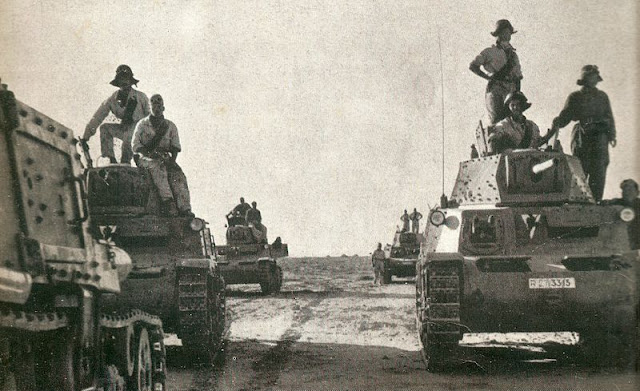 |
| Italian M13/40 tanks of the Banini Group outside Derna, January 1941. |
After taking the town, General O'Connor in the evening decides to ask Middle East Commander Archibald Wavell for permission to have the Australians pursue the retreating Italians northwest of Derna along the Via Balbia. More desert sandstorms hinder operations, and the supply lines once again are becoming quite extended, a serious issue particularly in terms of having sufficient water supplies. Wavell, in Nairobi until the 1st, will give O'Connor his answer upon his return.
The next town is Giovanni Berta, but it will take at least another few days to get there. The plan is for the 7th Armoured Division to proceed cross-country south of the Jebel Akhdar (Green Mountain) via Msus and Antelat. Thus, the British forces would be divided by the mountain, the Australians to the north and the 7th Armoured to the south. As it will be slow going for the British tankers, General O'Connor proposes to split off his fast wheeled vehicles under the command of Lieutenant Colonel J.F.B. Combe and send them ahead. This Combe Force will head to the northwest to try to cut the fleeing Italian 10th Army off south of Benghazi, whose capture is seen as the climax of Operation Compass.
The Luftwaffe's attacks on the Suez Canal pay off quickly when one sinks a dredger of the British Suez Canal Company in Lake Timsah. The dredger is later raised and repaired.
Royal Navy submarine HMS Upholder (Malcolm D. Wanklyn) attacks an Italian convoy thirty miles north of Zavia (Zawiya), Libya. However, it is unsuccessful, and the Italian escorts then unsuccessfully attack the Upholder.
On Malta, the military authorities consider using a burning petroleum mixture to defend against an invasion. Rather than burn the invaders, the intent is to create a thick smokescreen. The idea's main flaw is that the island does not have enough benzene to enact the strategy.
German/Finnish Relations: Finnish Chief of General Staff General Axel Erich Heinrichs visits Berlin for a meeting with OKH Chief of Staff Generaloberst Franz Halder (under cover of giving lectures about the Winter War). Halder at this point is preoccupied with developing the plans for Operation Barbarossa, and he makes the first official mention - more of a hint, but a broad hint - of the proposed operation to the Finns (of course, have been many rumors and hints previously, but this was semi-official and reasonably direct).
Halder expresses interest in the condition of the Finnish Army and the sort of terrain it would encounter during offensive operations. He notes that the Reich particularly is interested in the nickel mine at Kolosjoki, Petsamo, in Finnish Lapland, which now lies just across the border in the USSR. In fact, the mine is one of the top German strategic targets on the entire 2000-mile (projected) front. Neither side makes any commitments at this time, and officially, the Reich and USSR remain allies.
However, as noted, rumors are flying about in all sorts of different directions, with some casting all the talk about Operation Barbarossa as simply a diversion intended to cover the true objective: an invasion of Great Britain. While the Finns remain in doubt after this meeting about how serious the plans are to invade the Soviet Union, there now is no doubt that they are aware that the Germans are at least thinking and talking about it.
Anglo/Turkish Relations: British Prime Minister Winston Churchill's assistant private secretary, Jock Colville, records in his diary that Churchill drafts a telegram to Turkish President İsmet İnönü today for delivery on the 31st requesting that the RAF be permitted to base some squadrons on its territory in order to counter assumed German aggression in Bulgaria. Turkey is firmly neutral, however, and being closely watched (and courted) by the Germans as well, so it has to tread carefully.
 |
| "'I'll Torpedo U.S. Aid To Britain,' Says Hitler," NY Post, 30 January 1941. |
- Day Fighters
- Night Fighters
- Long Range Night Fighters
- Heavy Fighters
- Air to Ground Support Fighters
- Bombers
- Reconnaissance
- Transport and Glider
Rudolf Höss is promoted to SS-Sturmbannführer. Otto Skorzeny is promoted to Untersturmführer (notification in March).
 |
| Italian prisoners at Tobruk, January 1941. |
Soviet Government: Lavrentiy Beria, head of the NKVD (forerunner of the KGB), is elevated to be the Soviet Union's "top cop, becoming Commissar General of State Security. Beria, already a candidate member of the Politburo, is a particularly rough character who, it is said, personally strangled his predecessor, Nikolai Yezhov - but this may simply be Soviet mythmaking. Perhaps. Beria is one of Stalin's favorites because he does a lot of the state's "dirty work," which usually involves eliminating people. He also plays a direct role in the war at certain critical points, again in his role as "enforcer."
Australia: Prime Minister Robert Menzies continues his lengthy and tortuous journey to London, flying to Rangoon and then to Calcutta.
China: In the Battle of Southern Henan, the Japanese 11th Army is attempting, in three separate columns, to take over the southern section of the Ping-Han Railway. The Chinese 5th War Area (Li Zongren) does not oppose the Japanese frontally but instead forms a "crescent" which proves a danger to the Japanese flanks. Today, the Japanese take Wuyang, meeting little opposition from the Chinese.
German Homefront: Industrialists Friedrich Flick and Albert Vögler receive the War Merit Cross. The War Merit Cross is one of the only, and maybe the only, award made during the war that could be worn openly in Germany after the war (after 1957).
Future History: Richard Bruce Cheney is born in Lincoln, Nebraska. He attends Yale University, then interns with Congressman William A. Steiger. This begins a long career of public service which includes election to the US House of Representatives in Wyoming in 1978, serving until 1989. He becomes Secretary of Defense under President George Herbert Walker Bush, and then the 46th Vice President of the United States with President George W. Bush. Dick Cheney remains involved in politics in an emeritus role.
 |
| Australian troops approaching Derna, January 1941. (Australian War Memorial). |
January 1941
January 1, 1941: Muselier ArrestedJanuary 2, 1941: Camp Categories
January 3, 1941: Liberty Ships
January 4, 1941: Aussies Take Bardia
January 5, 1941: Amy Johnson Perishes
January 6, 1941: Four Freedoms
January 7, 1941: Pearl Harbor Plans
January 8, 1941: Billions For Defense
January 9, 1941: Lancasters
January 10, 1941: Malta Convoy Devastation
January 11, 1941: Murzuk Raid
January 12, 1941: Operation Rhubarb
January 13, 1941: Plymouth Blitzed
January 14, 1941: V for Victory
January 15, 1941: Haile Selassie Returns
January 16, 1941: Illustrious Blitz
January 17, 1941: Koh Chang Battle
January 18, 1941: Luftwaffe Pounds Malta
January 19, 1941: East African Campaign Begins
January 20, 1941: Roosevelt 3rd Term
January 21, 1941: Attack on Tobruk
January 22, 1941: Tobruk Falls
January 23, 1941: Pogrom in Bucharest
January 24, 1941: Tank Battle in Libya
January 25, 1941: Panjiayu Tragedy
January 26, 1941: Churchill Working Hard
January 27, 1941: Grew's Warning
January 28, 1941: Ho Chi Minh Returns
January 29, 1941: US Military Parley With Great Britain
January 30, 1941: Derna Taken
January 31, 1941: LRDG Battered
2020




